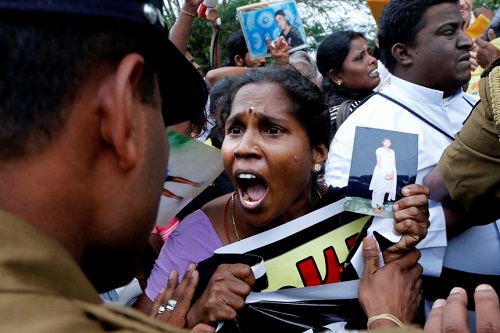AP photo
By
Amnesty International
Following the ninth anniversary of the end of the war, human rights NGO Amnesty International calls on the government of Sri Lanka to provide information to the families of the disappeared, with detailed lists and information of persons who surrendered to the armed forces in the final phase of the war. The President of Sri Lanka, Maithripala Sirisena, acknowledging the grievances presented by family members in June 2017, promised that he would instruct the National Security Council to release these lists.
According to surviving family members, more than 100 cadres of Liberation Tigers of Tamil Eelam (LTTE), a former armed opposition group, who surrendered to the Sri Lankan army near the Vadduvaikkal Bridge in Mullaitivu at the end of the war in May 2009, have subsequently disappeared. Reportedly, one group of surrenders was led by Father Francis Joseph, a Catholic Priest who was disappeared thereafter. According to family members who witnessed the surrenders, they were transported from the site by the army in a convoy of buses: their fate and whereabouts since then remain unknown. Amnesty International reported on this alleged case of mass enforced disappearance in an April 2017 report: “Only Justice Can Heal Our Wounds: Listening to the Demands of Families of the Disappeared in Sri Lanka”.
As far back as August 2013, 13 of those families filed habeas corpus applications in the courts of Sri Lanka, seeking information about their whereabouts. They claim to have last seen their family members in the custody of the 58th Division of the Sri Lankan Army. In February 2016, the General Officer Commanding of the Division, Major General Kavinda Chanakya Gunawardena was ordered to submit the list to the Mullaitivu Magistrate court before 19 April 2016. Subsequent to failing to produce this list on two occasions, the Magistrate in late September 2016 ordered the Criminal Investigation Department to investigate. This was after ruling that the documents eventually filed by the army were not a complete record of all those who had been detained by army, but instead reflected only those people who had completed “rehabilitation.”
The President who is also the Chairperson of the National Security Council promised that he would instruct the Council to release lists of persons who surrendered to the Armed forces in the final phase of the war. He is also the Commander in Chief of the Armed Forces. However, 11 months later these lists have not been released.
The alleged case of mass disappearance has been recorded in a number of reports both domestic and international, including in the government-appointed Lessons Learnt and Reconciliation Commission of Inquiry report as “Representations to the Commission regarding alleged disappearance after surrender/arrest,” as well as the Report of the Office of the High Commissioner for Human Rights Investigation on Sri Lanka as “Enforced disappearances at the end of the armed conflict.”
The mass disappearance of those who surrendered at the end of the war is a clear indication of the institutionalization of the practice of enforced disappearances in Sri Lanka. The State’s concealment of the fate, whereabouts and information of the disappeared person triggers criminal responsibility.
Sri Lanka has one of the world’s highest number of disappearances, with a backlog of between 60,000 and 100,000 alleged disappearances since the late 1980s. Given the lack of accountability for these cases, Amnesty International has noted that there is no shortage of examples of thwarted justice in Sri Lanka.
Sri Lanka has made welcome progress on the issue of disappearances with the criminalization of enforced disappearances in March 2018, thereby giving partial effect to the International Convention for the Protection of all Persons from Enforced Disappearance and operationalizing the Office of Missing Persons.
However, the government of Sri Lanka must support the spirit of these measures by proactively supporting truth-seeking efforts by the families of the disappeared to get answers, almost a decade after the end of the armed conflict. Likewise, Sri Lanka should promptly recognize the competence of the Committee on Enforced Disappearances to receive and consider communications from or on behalf of victims or their relatives.
Amnesty International is a non-governmental organisation focused on human rights with over 7 million members and supporters around the world. The stated objective of the organisation is “to conduct research and generate action to prevent and end grave abuses of human rights, and to demand justice for those whose rights have been violated.”



No Comments Yet!
You can be first to comment this post!